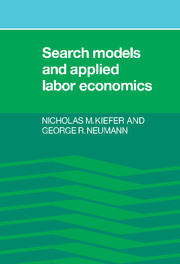1 - Introduction
Published online by Cambridge University Press: 06 October 2009
Summary
The labor market is a fascinating and important market in modern economies. Imperfect and asymmetric information, heterogeneity among workers and firms, labor unions and bargaining, implicit and explicit long-term employment arrangements are all present in the labor market. Thus, this market has a much more complicated and diverse structure than, say, spot markets for homogeneous goods or financial markets. Yet understanding the labor market is crucial for understanding movements in macroeconomic aggregates – business cycles – as well as for evaluating the important welfare questions associated with the presence of unemployment. Payments to labor make up about two-thirds of gross domestic product in the United States, in the United Kingdom, and across the European Economic Community. How well do economists understand this important component of the economy? Perhaps it will suffice to point out that a wage equation, run on a sample of individual workers, is considered to have a “good fit” if it explains about 25 percent of the variance in wages.
The literature on job search represents a breakthrough in modeling the labor market. In the search framework, uncertainty is explicitly handled in the theoretical treatment of the worker's behavior. Employment is determined as workers sample wage offers from a distribution and accept jobs that have acceptable wages. In this model, “lucky” workers may earn more than identical workers who were not so lucky in their draws from the wage distribution.
- Type
- Chapter
- Information
- Search Models and Applied Labor Economics , pp. 1 - 20Publisher: Cambridge University PressPrint publication year: 1989



